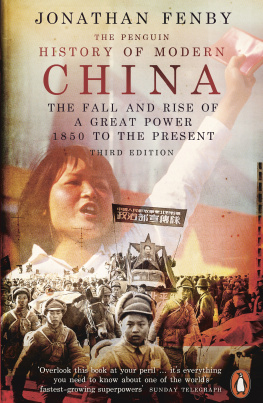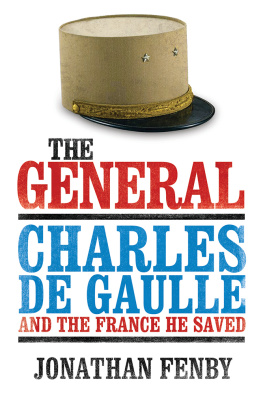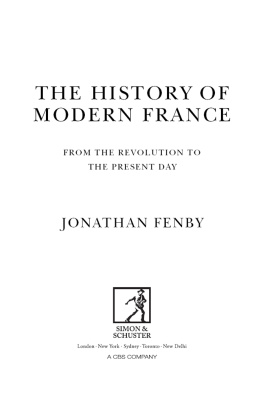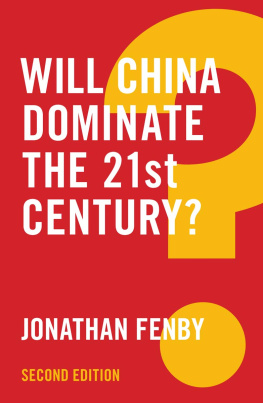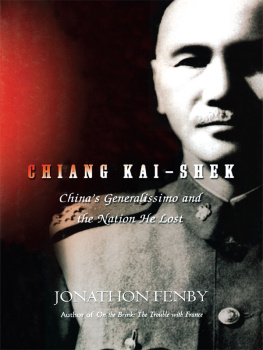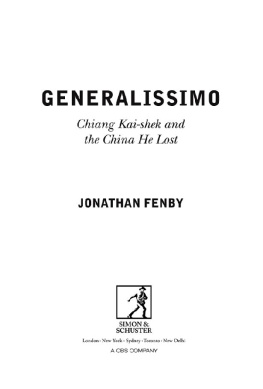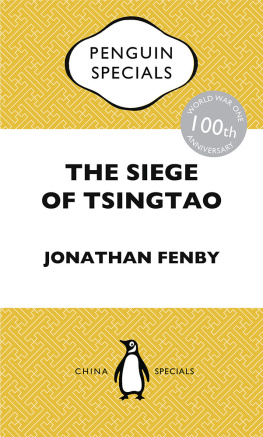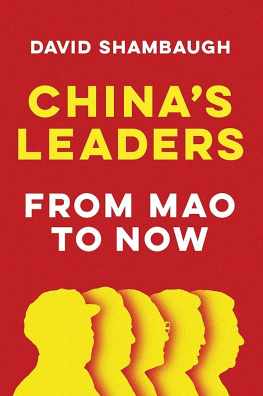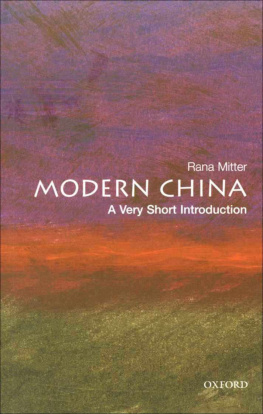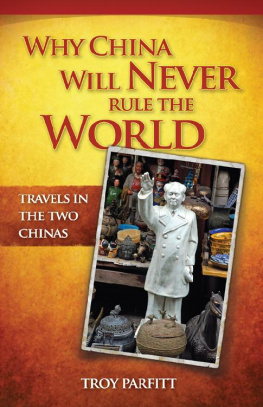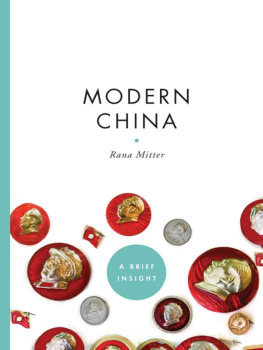
Contents
- PART 1:
End of Empire - PART 2:
Revolution and Republic - PART 3:
Wars Without End - PART 4:
The Rule of Mao - PART 5:
The Age of Deng - PART 6:
Jiang Zemin and Hu Jintao
Jonathan Fenby
THE PENGUIN HISTORY OF MODERN CHINA
The Fall and Rise of a Great Power, 1850
Third Edition
PENGUIN BOOKS
UK | USA | Canada | Ireland | Australia
India | New Zealand | South Africa
Penguin Books is part of the Penguin Random House group of companies whose addresses can be found at global.penguinrandomhouse.com.
First published by Allen Lane 2008
Published in Penguin Books with minor revisions 2009, 2013, 2019
Copyright Jonathan Fenby, 2008, 2009, 2013, 2019
The moral right of the author has been asserted
Cover photographs: Baldwin H. Ward and Kathryn C. Ward/Corbis; Bettman Archive/Corbis
ISBN: 978-0-141-91761-0

THE BEGINNING
Let the conversation begin
Follow the Penguin Twitter.com@penguinUKbooks
Keep up-to-date with all our stories YouTube.com/penguinbooks
Pin Penguin Books to your Pinterest
Like Penguin Books on Facebook.com/penguinbooks
Listen to Penguin at SoundCloud.com/penguin-books
Find out more about the author and
discover more stories like this at Penguin.co.uk
PENGUIN BOOKS
THE PENGUIN HISTORY OF MODERN CHINA
A newsdesk blockbuster, packed with facts and breathless drama Independent
At times he is the prosecutor, seeking the truth behind sacred planks of Chinese propaganda At other moments he has a journalists eye for telling details Fenby finds facts that jolt and surprise Daily Telegraph
Panoramic narrative a wonderful resource Professor Pamela Crossley in the Far Eastern Economic Review
For an accessible, authoritative, fair, comprehensive and well written account, this would be hard to better BBC History
Reads like a novel and is never less than thoughtful and compassionate for the fate of a much-abused people Herald
Vivid Fenby excels at weaving the strands of his complex narrative into heroic and more often harrowing tales The Times
The most compelling and judicious account of Chinas phoenix years that is currently available A journalists eye for detail, undemanding prose and a thunderous sense of narrative assure Jonathan Fenby of a triumph The Times Literary Supplement
[Fenby] has identified a gap in the literature on the country that anyone who claims to be informed about the contemporary world needs to at least try to understand Readers will relish this book The Australian
Note on Transliteration and Currency
The Pinyin system of transliteration has generally been used in this book with the exception of some names such as Sun Yat-sen, Chiang Kai-shek, the Soongs or Canton which are most familiar in the older Wade-Giles system. Earlier transliterations of the names of cities are given in footnotes.
The currency denoted by the $ sign up to 1949 is the Chinese yuan; where US dollars are involved, this is specified. Thereafter, $ = US currency.
ABOUT THE AUTHOR
Jonathan Fenby has edited the Observer, the South China Morning Post and Reuters World Service as well as holding senior positions at the Economist, Independent and Guardian. His books include Generalissimo: Chiang Kai-Shek and the China He Lost, Dealing with the Dragon: A Year in the New Hong Kong, Seventy Wonders of China, Dragon Throne, Alliance: How Roosevelt, Stalin and Churchill Won One War and Began Another and Crucible: Thirteen Months that Forged Our Worlds. He is currently China Chairman of the TSLombard research service. He was made a Commander of the British Empire in 2000 for services to journalism and is a knight of both the Legion dhonneur and the French Order of Merit.
The Penguin History of Modern China was selected among the 2008 Books of the Year by the Economist and the Financial Times.
To Rene, with love again
Acknowledgements
Simon Winder commissioned this book in the first place and has been as enthusiastic and constructive an editor as an author working through 150 years of complex history could wish for. So my first thanks go to him, followed by Christopher Sinclair-Stevenson, who convinced me that this was not too great a mountain to set out to climb.
Robert Ash and Rana Mitter were supportive of the project, and devoted time to reading portions of the manuscript to come up with most helpful suggestions. I am also particularly grateful to Bob Ash for data on social and economic conditions since 1949. Lisa Croll smoothed my way to the invaluable resources of the School of Oriental and African Studies in London: she is sadly missed. I have also benefited along the way from the help and observations of the late Richard Baum, Jasper Becker, Jean-Philippe Bja, Robert Bickers, Kerry Brown, Robert Elegant, Joseph Fewsmith, Paul French, Isabel Hilton, Christopher Hughes, David Kelly, William Kirby, Willy Lam, Jonathan Mirsky, Steve Tsang, Richard Pascoe and their colleagues at Nottingham University, Sun Shuyin, Gary Tiedeman, Ezra Vogel, Arne Odd Westad, Hans van de Ven, and Xinran and Wei Zhang, as well as from the knowledge and wisdom of the China Pol website.
Mark Handsley copy edited the book expertly, and was long-suffering with last-minute additions. Amanda Russell handled the photographic research with great skill and understanding. Alice Dawson and Richard Duguid at Penguin kept the wheel turning most efficiently. Rebecca Lee showed both dexterity and patience in seeing through the changes to bring the paperback edition up to the present day.
This book draws on the extensive body of written work on modern China by historians on four continents, and on discussion and meetings with some of them. I am constantly struck by the breadth and depth of scholarship on China, from detailed monographs to wide surveys of the country and its recent past. While it may be invidious to single out any particular books from those mentioned in the bibliography, I am particularly indebted, in addition to those authors cited above, to works by Lloyd Eastman, Joseph Esherick, Immanuel Hs, Simon Leys, Roderick MacFarquhar, Evelyn Rawski, Michael Schoenhals, Jonathan Spence and Frederick Teiwes. As indicated in the text, I drew on the Tiananmen Papers edited by Andrew Nathan and Perry Link for the events of 1989. Graham Hutchingss Modern China was, once more, an invaluable reference point. My colleague Lawrence Brainard provided stimulating insights into the post-reform Chinese economy, while Alexander Monro came up with revealing nuggets and Bo Zhuang was of great assistance in supplying information and improving my display technique. As in previous books, I have also drawn substantially on contemporaneous accounts by journalists and other observers which provide eyewitness material often missing in archival documents and can act as a valuable counterweight to the official line handed down by successive regimes.

